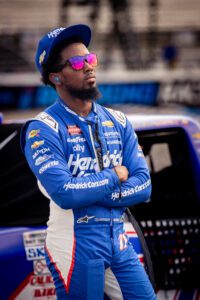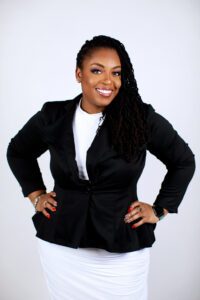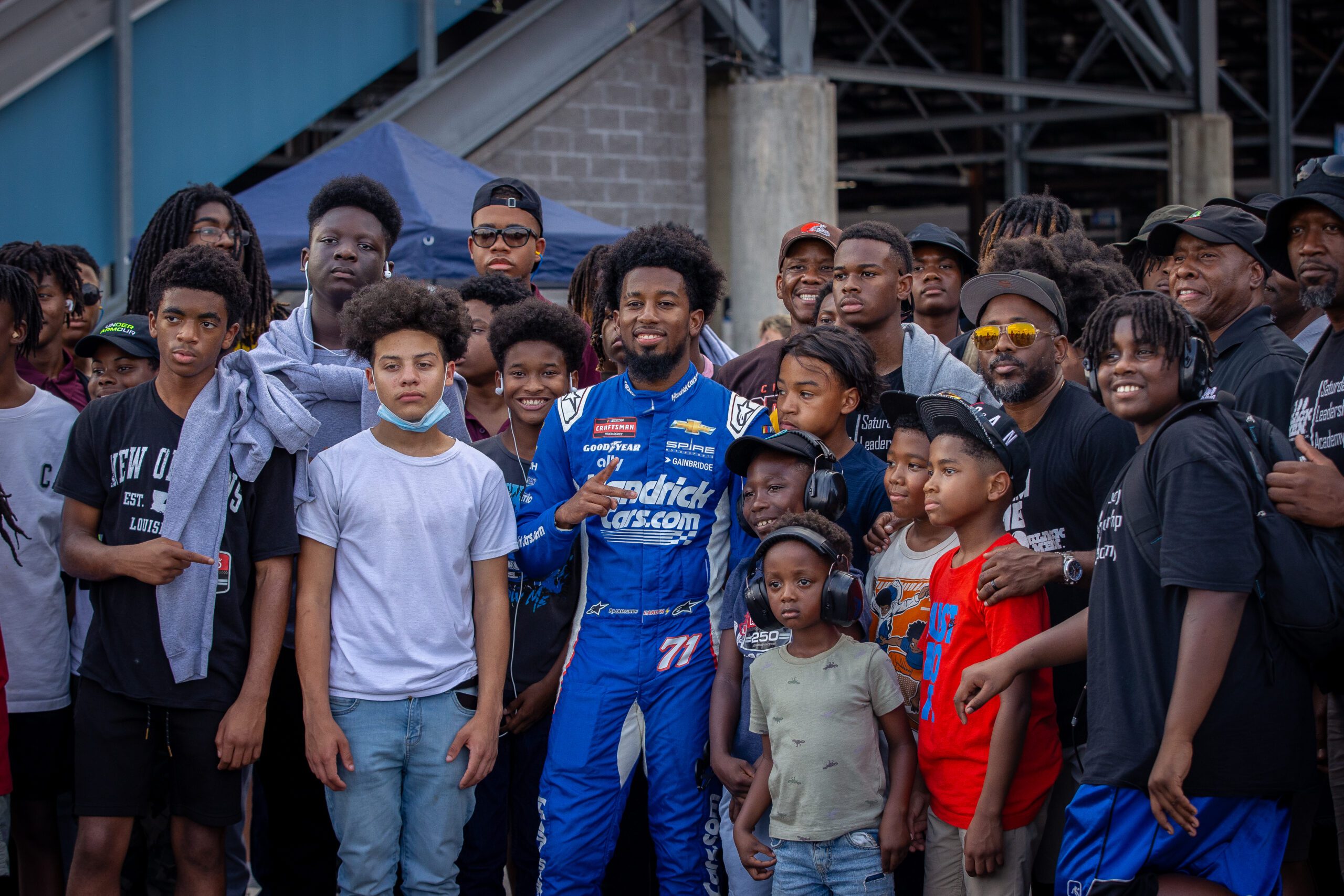By Catherine Komp, Engagement Director
A few years ago, Maryland Public Television wanted to expand a local initiative that created special programming and events around HBCU Week, a national effort to raise awareness about Historically Black Colleges and Universities. With North Carolina home to the second most HBCUs in the country (following Alabama), they called up PBS NC to join them in the project.
Black Issues Forum, which just launched its 39th season on PBS NC, jumped at the opportunity, producing specials on Raleigh’s Shaw University, the first HBCU in the south and on the Elizabeth City State University, the only four-year collegiate aviation education program in the state.
Ahead of this year’s HBCU Week, we had the opportunity to chat with Black Issues Forum Host and Producer Kenia Thompson to learn about this public broadcasting collaboration, the conversations it can spark and opportunities to share more stories about North Carolina’s HBCUs. Kenia’s also an educator who’s taught at NC State, her alma mater William Peace University and this semester, at Wake Technical Community College.
NC Local: What is HBCU Week and how did PBS NC get involved?
Kenia Thompson: Essentially it’s the time to really uplift our historically Black universities and colleges within the community and highlight the work that they’ve done. We got pulled into this project by Maryland Public Television. This is our second year doing this with them. We were asked to pick an HBCU in the wonderful state of North Carolina, which has 11 accredited HBCUs, and to select either an area of innovation or an area of historical prominence. We chose innovation and Winston-Salem State University for their motorsports program. We actually have a rising star in this state that comes from Winston-Salem State, Rajah Caruth. He has been in NASCAR now for, I think the last two years. NASCAR and Winston-Salem State University have a unique and very wonderful partnership and collaboration where they feed into the school and the school allows for their students to vet out potential opportunities with NASCAR. It’s great, especially in a space where minorities haven’t always been embraced and so to have this collaboration with an HBCU, I think is monumental. It’s historical honestly.
Tell us more about producing this week’s segment, which airs Friday September 13th.

My Executive Producer Deborah Holt Noel and I collaborated on this one and we tag teamed some interviews, but there isn’t a journalist voice in the segment. It’s the voice of Rajah and the voice of the school. And so it’s beautiful because you hear from them about why this is a historical and monumental partnership, number one, and then the impact that Winston-Salem State University has had on Rajah, the students, his peers and the professor too and the community. So this Friday’s episode is going to feature our special that we’ve produced for this HBCU partnership and then we’re also going to talk about the future of education and what does that look like, not just for HBCUs, but for all schools and for all students too. Since the pandemic we’ve been seeing a dip in folks that were ready for school. And I just read an article today that says numbers are starting to rise. And so I’m glad to see that great. It’s great news, but how are schools preparing for that rise? Because I think we had to, and I say we because I’m an educator too, we had to retroactively adjust to students and meet them where they are, where they were. And now that we’re seeing a rise, it’s like all right, we got to challenge our students because they are our future.
Last year for HBCU Week, you did a spotlight on Elizabeth City State University and their aviation program, which is the only four-year collegiate aviation education program in the state, and also the evolution of the school under Chancellor Dr. Karrie Dixon [Ed’s note: Dixon is now at NC Central University]. With 11 HBCUs, where did you start with narrowing down story ideas for this initiative? What stories did you want to make sure were told?
Uniqueness is what stood out in our brainstorming meeting of what schools we should tackle. A lot of schools offer a lot of the same things and so the question to us was which school has a program that is hard to come by and uniquely offers our minority students a competitive edge. Last year’s aviation program was a no brainer, thinking about AI and drones and how cutting edge that was. That was just perfect. And then to see the rise of a school that for all points and purposes, was on the brink of losing accreditation, just make a 180.
And then Winston-Salem State University again, one of our other producers just sent an article about Rajah and was like have you seen this? This would be a great episode on Black Issues Forum and coincidentally that was around the same time that we were tasked with picking a school for this special project and we thought, innovation, that falls perfectly in line with that.
Finding stories, I think, can be one of the hardest things, or one of the easiest things, and the differentiating factor is community and support. If you’ve got a community behind you, they don’t have to necessarily work on the show or be on your team. I get story leads and ideas from so many people just because they know Kenia always needs story leads and ideas, and this would be a great story. We were fortunate to have people in our corner that said, “Hey, this could be a great story.” And it had perfect alignment with this mission.
I loved the HBCU alum at PBS NC that were highlighted on the website last year and they had such powerful quotes about going to college at a place where you weren’t different, and seeing yourselves in the deans and the Chancellor. Is this initiative partially to expose young Black and brown youth to the opportunities at HBCUs?
I think so. I wish I had went to an HBCU from all the things that I’ve actually learned by being on this show. I went to a PWI (predominately white institution) and had a great experience. I would do it over again. But also seeing the pride, the love, just the unwavering support that people have for their HBCU, you realize that it goes beyond the school and it’s really about identity. So to your point, I think that it provides space for young Black and brown children to say, “Hey, there’s a place where I can go that I do feel safe.” You know, I’m torn because I hate the idea that we have to have a place to go to feel safe. But reality is that’s the case for some people and for some people, it’s not about feeling safe. It’s just about feeling comfortable, right? It’s about being around people who understand and who like the same things you do and who can just get it with just the look. And so it’s beautiful to see people come together and embrace one another in these communities. I think it’s just one of those unspoken feelings that if you’ve gone to an HBCU, you just understand.
What other conversations do you hope this type of programming and content sparks?

Any and every conversation that heals hearts, heals minds and educates people. And that’s everything from— we’ve done conversations around hair, we’ve done conversations around gentrification, around employment, gospel music, obviously education has been huge, art and the NC Museum of Art exhibit of Black Panther costume designer Ruth E. Carter. It’s about exposing folks to the fact that we can do everything too. Again, part of me loves this platform because it’s an opportunity to once again educate the masses. But part of me hates the fact that we have to have it. And so that’s the goal of this show; not that I want one day not to have it to host anymore, but that we won’t need it. And as a result, if we don’t need it anymore, that means we’ve done our job. We’ve had the conversations, we’ve been able to penetrate the minds of folks that maybe were thinking one way and now think another. I just would love a world where we can all sit, hold hands and talk about everything and that’s kind of where I see Black Issues Forum serving the community in that way.
In addition to the piece that we will show on Friday, we’re also going to have a community event on campus. So that’ll be an opportunity for us to have a forum of discussion and to talk to the students. And it will happen before elections, so it’ll be another opportunity for us to hear what’s top of mind for folks because we have been weaving in election conversations and a tour of HBCUs.
What other stories about HBCUs do you think need more amplification?
I think it’s the story of support. Support looks differently for a lot of various organizations and entities and for HBCUs, it’s really about not forgetting that they’re in the community and not forgetting that for a long time they were in the community alone, for the purpose that they served. Many people say, “Why do we still need them around?” A lot of things are still around because of the reminder that it instills your value of who you are. It’s a connection point. And if we continue to support our HBCUs, we will see a lot of benefits to our communities. Because minority issues are everyone’s issues and so if we continue to give them the support that they’ve deserved for a long time, we’ll see that tenfold back in community. There are a few that have faced accreditation challenges and other things. But as we meet opportunities for innovation, for collaboration, they’re the perfect organizations and institutions to collaborate with in communities simply because they’re usually on the smaller side, you’ve got students who are very passionate about the work that they’re doing, and it provides for new opportunities in community all the time.
Watch the HBCU special WSSU and Rajah Caruth on Black Issues Forum this Friday at 7:00 PM, online at PBSNC.org and on YouTube. The show also recently covered Facts over Fiction: Voting in the Digital Age and Updates on the Presidential Election & Why Your Vote Matters. Here are a few of their upcoming election specials:
October 4th: Greensboro election special focusing on the business climate and cost of living
October 18th: Anson County election special focusing on health care and education
November 1st: virtual panel with college students
Find all the national HBCU Week programming here.



